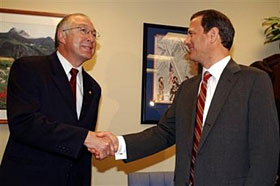 |
 |
 |
 News from Around the Americas | September 2005 News from Around the Americas | September 2005  
Spotlight Turns to Next Court Nominee
 Deb Riechmann - Associated Press Deb Riechmann - Associated Press


| | John Roberts, right, shakes hands with Sen. Ken Salazar, D-Colo., on Capitol Hill Friday. Republicans and Democrats alike are looking beyond John Roberts' virtually certain confirmation as the nation's 17th chief justice to President Bush's next nominee to the Supreme Court, expecting a quick announcement from the White House and a much tougher confirmation fight. (Photo: Dennis Cook) |
Republicans and Democrats alike are looking beyond John Roberts' virtually certain confirmation as the nation's 17th chief justice to President Bush's next nominee to the Supreme Court, expecting a quick announcement from the White House and a much tougher confirmation fight.

Three Democrats on the Senate Judiciary Committee sided with the panel's 10 Republicans on Thursday in a 13-5 vote to endorse Roberts, sending his nomination to the floor of the Senate for a confirmation vote no later than next Thursday.

With little suspense left in Roberts' climb to the Supreme Court, speculation focused on whether the support from three Democrats gives Bush any more or less leeway to nominate someone more conservative than Roberts to replace retiring Justice Sandra Day O'Connor.

"I think there were people in the White House who hoped the Democrats would all vote for him and show that Roberts was a high-quality nominee," said Stephen Wermiel, an American University law professor. "There were other people in the White House who hoped the Democrats would all vote against him, thinking that would help the president feel liberated to do whatever he wanted to do next."

Regardless of their motives, it was clear the Judiciary Committee members were eyeing Bush's next pick for the court.

"I think that some of the voting today was calculated to impact on the next nomination," said Sen. Arlen Specter, R-Pa., chairman of the committee. Some senators believed that backing Roberts puts them in a better position to oppose the next Bush nominee, while others thought that opposing him puts the president on notice that he had better put someone up who was acceptable to a broad spectrum of senators.

Norm Ornstein, a political analyst with the American Enterprise Institute, a conservative think tank in Washington, said anyone familiar with the Bush White House knows that a strong Democratic vote against Roberts would convince Bush that Democrats would reject anyone he'd nominate "so why bother nominating anyone but a fire-breathing conservative."

The White House, which has been keeping details of Bush's selection process secret, said only that the president planned to nominate a highly qualified candidate whom Americans can be proud to have on the court.

"The historic standard, particularly with recent nominees, has been based on qualifications," White House press secretary Scott McClellan said. "Judge Roberts clearly has far exceeded that standard, and earned broad-based support. The Senate has traditionally joined together in support of those nominees who were well-qualified to sit on the court, and avoided becoming beholden to partisan interest groups."

Some lawmakers and legal analysts claimed the three Democrats Sens. Patrick Leahy, Russ Feingold and Herbert Kohl likely supported Roberts so they would not be cast as obstructionists.

"If the Roberts' confirmation is a foregone conclusion, why look like a knee-jerk obstructionist?" asked Brad Berenson, formerly a lawyer in the Bush White House. "It's far better to preserve the appearance of being fair-minded and try to convince the president he has a chance to get your vote if he nominates someone to your liking. It also gives you the ability to oppose the next nominee with greater credibility."

The idea of using the Roberts vote to position oneself for the next confirmation hearing was rejected by David Carle, a spokesman for Leahy, the ranking Democrat on the Judiciary Committee.

"For Democratic senators this is a vote of conscience, not a chess game," Carle said. "That's why Democratic senators are not voting in lockstep, unlike some partisans who cheerlead for anyone the White House picks, even before hearings are held."

Lynn Becker, a spokesman for Kohl, D-Wis., said the senator considers every nominee based on his or her merits and casts his vote accordingly. And Feingold, also a Democrat from Wisconsin, hinted that while he voted for Roberts, he might not be willing to embrace a conservative federal appellate judge like Janice Rogers Brown, who has been mentioned as a possible replacement for O'Connor, the swing vote on issues including affirmative action, abortion, discrimination and death penalty cases.

The Democratic support for Roberts, however, marked a stinging defeat for the liberal groups that are lobbying energetically against his confirmation.

"The vote shows that a strong, unapologetic, judicial conservative in the mold of Justices Antonin Scalia and Clarence Thomas can not only be confirmed without filibuster but can actually pick up Democrat votes," said Wendy Long, counsel for the Judicial Confirmation Network.

But despite being on the losing side of the vote, Sen. Charles Schumer, D-N.Y., issued this warning to the White House:

"Please send us a moderate, but if you send someone who is very ideological there'll be a much bigger fight than on Roberts because this is for the O'Connor seat and that's the swing vote on the court." | 
 | |
 |



